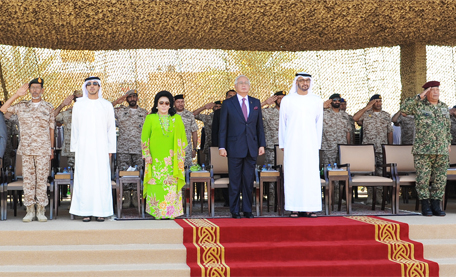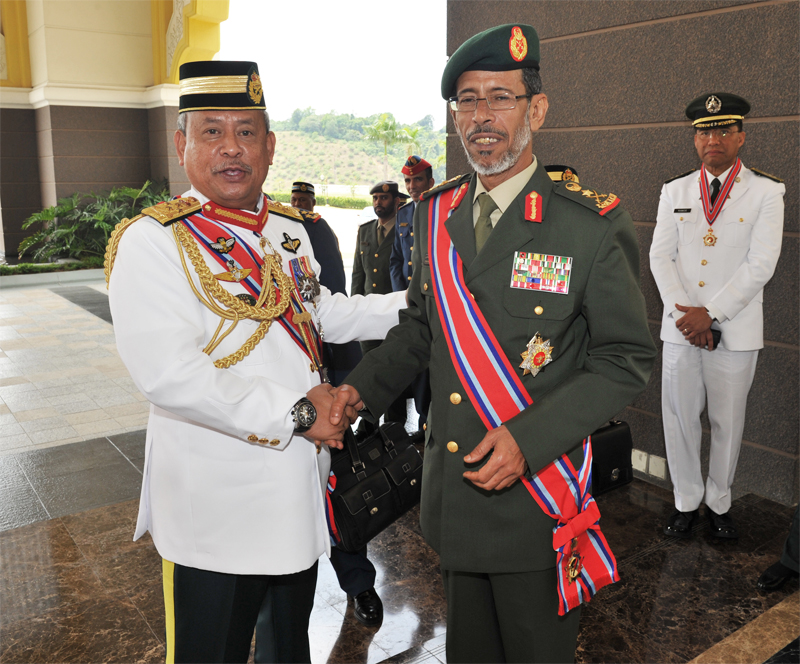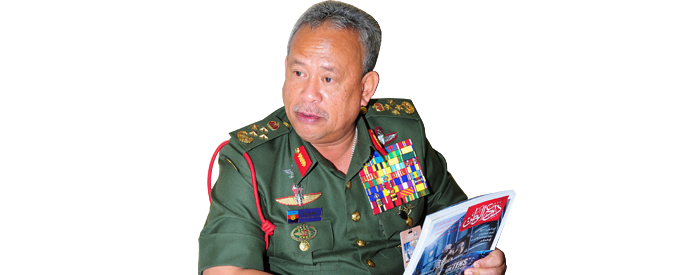2015-04-01
MALAYSIA, UAE BOAST STRONG TIES
Joint training, exercises suggested for future
Malaysia and the UAE have close ties and it’s expected there will be closer collaboration as security threats around the world grow at such a rapid rate. Malaysia also has a shopping list for military hardware. Malaysia is an IDEX regular and in a wide-ranging interview Gen Tan Sri Dato’ Sri (Dr.) Hj Zulkifeli bin Mohd Zin, Chief of Defence Force, Malaysia spoke to Nation Shield on the sidelines at the recent expo.
By: Staff Lt. Col. Yousef AlHaddad,
Editor in Chief
The relationship between Malaysia and the UAE has become very strong. What do you think the future relationship will be, military wise?
There is a common understanding today that no nation can face a threat on its own. There has to be networking because there will be common threats that you will be facing. Look at the threat of terrorism, ISIS for that matter. Not only that, it could be an emerging threat in my region, South East Asia.Then you have the misguided people from my region who are now with ISIS. So therefore the collaboration between the Malaysian Armed Forces and the UAE Armed Forces is another strategic collaboration, where we need to work together to avoid future threats that might emanate from region and could also be a threat to this part of the world. Also, a threat emerging from this region could be a threat to my region as well. So we are very happy to collaborate with our brothers in the UAE Armed Forces.
What is your aim in visiting the recent IDEX 2015?
Well, first of all I would like to thank the UAE Armed Forces for inviting the members of my delegation and me to this year’s IDEX. I always look forward to coming to IDEX. I attended my first one in 2011 and missed the one in 2013. And I can see that there is a great difference in the number of people; the exhibitors have increased and the latest technology is on display here.
I am here because there are exhibitors who have come here from foreign as well as local defense industries of the UAE and have the latest systems. This is where I can see them, especially the Navy and land systems. I am very impressed with the new technology I have seen here . I am also looking at the combat vehicles that are coming up and are using commercial spare parts so it is easier and cheaper for us to maintain. I think this is the way forward and I have seen some of the systems that are using these parts here.
The UAE today has lots of companies that have been developing very fast for several years. What is you evaluation of these companies?
Well, I have heard a lot about Tawazun and Mubadala and I am very impressed with what they are doing. Tawzun and Mubadala have been amalgamated under the Emirates Defense Industries Companies (EDIC). I think that is the way forward. Of course there would be some overlapping between Tawazun and Mubadala and with the amalgamation they will be able to do away with this overlapping. It will be more focused, it will add more value and they will be able to maximize the skills and resources that are available. This is how I look at it. I came to know that Mubadala started in 1991/1992 from humble beginnings and over a period of time developed into what it is today, and the development is quite impressive.
The UAE is a typical example where defense industries originate within the military and develop to this level. In other countries there is such development, but it is mostly outside the military. This is within the military and is more focused as the military knows what it wants in the future and can develop according to that.
The UAE has played a key role in helping other nations during floods and other natural calamities. Your thoughts on the military in this area?
We must always remember that the military is not always a fighting machine. By virtue of the organization of the military, it has other functions, especially so in the domain of military operations other than war such as assistance and disaster relief, providing military medicine etc. The militaries are trained for these missions, not only to be of assistance in these natural calamities and disasters within the country, but to also be able to assist other countries.
The UAE Armed Forces has the capacity and the ability to help others. It will be worthwhile if we are able to collaborate and cooperate within the region and form an understanding that if there is a neighboring country outside the region that requires assistance then a collaborative organization will be able to help. In South East Asia, what we have done now is we have formed standard operating procedures for the armed forces to help other countries.

What can the UAE and Malaysia do to improve national security together?
There are a lot of areas where we can cooperate in terms of national security. One important thing is the exchange of information on common threats like terrorism and so on. Also, joint training by the two forces is an area that we should look into, not only in information exchange but also in counter-terrorism operations. We can do exercises in that area. And also for maritime security, we could do a bilateral joint exercise. These are the things that we would want to work on with the UAE.
Since last year, the UAE has made it compulsory for graduates to join the military service. What do you think about this?
National service is a good thing, especially for countries that have a small population. It serves many purposes. One, you will have a regular intake of recruits joining the military and serve the country. The other thing is it helps to build the spirit of patriotism of the people and it will help to build a more disciplined population. This will be able to give them exposure of national security so that they will have a better understanding of security. In order for development to take place in a very conducive manner, stability and security is important. For a country with a small population, national service is a good approach.
Do you think it is important for people from here to go to Malaysia and study and for people from there to come here?
This is very important. There must always be exchange of students at all levels, not only at the national defense level. We have offered other countries the opportunity to come to our Military Defense College. A national defense college is not only meant for the military, it is also meant for other top government officials, to come study there and understand about national security. National security is the responsibility of all government agencies, not the military alone. So the existence of the national defense college provides opportunities for other top government officials from other ministries such as Ministry of Interior or Ministry of Agriculture. It provides a better understanding and is more collaborative in terms of national security.
How important do you think is an armed forces media department?
All forms of media are very important. But one important thing is that the military people should know how to engage media. Because media is a double-edged sword, it can either work for you or against you. Therefore, it is important for us to teach our officers to handle media. The military media is very important for the organization to reach out to the people and tell them the military’s visions and missions, to the locals and to the world and how you are contributing to world peace and development. When I look at the Nation Shield journal, I am very impressed. If one person reads it, they can pass the skills and knowledge to others. That is the multiplication effect of the media. Especially now with everything online it is all the more important as people far from the country can know what is going on at home.

• Gen Tan Sri Dato’ Sri (Dr.) Hj Zulkifeli bin Mohd Zin is the 18th and the current Chief of Malaysian Armed Forces.
• In 1974, upon completion of his cadet training in Sandhurst, he was first commissioned as a Second Lieutenant to the 2nd Battalion of the Royal Malay Regiment as a Platoon Commander on 09 August 1974.
• He holds a Master of Science degree from the National Defense University and is also a graduate from the Malaysian Armed Forces Staff College (MTAT) and the Malaysian Armed Forces Defence College (MPAT). Both Colleges will be placed under the soon to be established National Defence Studies Center (PUSPAHANAS).
• He was promoted to the rank of Brigadier General in 2002.
• Appointed Deputy Army Commander on 2 June 2008 - serving until 20 May 2010 upon which he was appointed Army Commander.
• Due to high confidence in him, he was appointed as the 18th Chief of Malaysian Armed Forces effective 15 June 2011.




No Comments